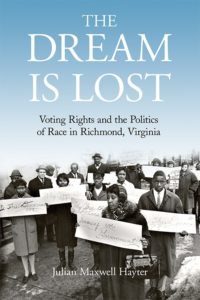 Voting Rights and the Politics of Race in Richmond, Virginia
Voting Rights and the Politics of Race in Richmond, Virginia
Historian Julian Maxwell Hayter starts out The Dream is Lost by observing that Richmond, Virginia is “seldom central to the narrative of the American civil rights movement”, but his study of race and politics in that city from the 1950s to the 1980s proceeds to make a persuasive case for why it should be. His account follows the political struggles of African-Americans who formed groups like the Richmond Crusade for Voters to avoid being disenfranchised. Hayter’s work shows that local activism and legal measures like the Voting Rights Act led to African-Americans gaining political power in the city, but it also chronicles how economic woes caused by the legacy of white supremacy made that an almost pyrrhic victory.
Reviews and endorsements of the publication include:
“This detailed narrative explores the quest for African American political power but also chronicles the limitations of this achievement. Hayter’s description of voter mobilization efforts, coalition building, and litigation offer an important level of detail to our understanding of black politics during and after the civil rights era.”—Pippa Holloway, author of Living in Infamy: Felon Disenfranchisement and the History of American Citizenship
“This illuminating book offers a sobering account of the limits of politics as a vehicle to transform African American communities.”—Timothy N. Thurber, author of Republicans and Race: The GOP’s Frayed Relationship with African Americans, 1945–1974
For more information on the publication, click here.
Fellow travelers are scholars, activists, and practitioners that embody the ideals and commitments of the Project on Lived Theology. We admire their work and are grateful to be walking alongside them in the development and dissemination of Lived Theology.
